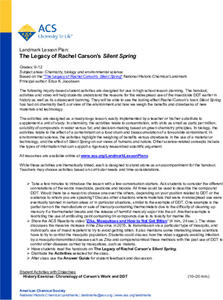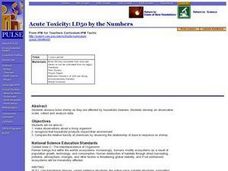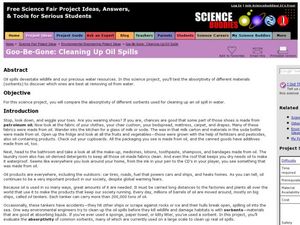American Chemical Society
The Legacy of Rachel Carson’s Silent Spring
How do we protect crops and protect the environment at the same time? Using reading materials, learners explore the history of the use of pesticides and biocides. They create a timeline and then explore the current practices.
Curated OER
Nutrition: It's In Your Hands
Fourth graders use this lesson to focus on their health, nutrition and the state of the environment. In groups, they examine the various types of land, water and air pollutants and compare and contrast a food chain with and without a...
Curated OER
Fertilizers, Pesticides and Human Health
High schoolers define several vocabulary terms related to chemicals and toxicology. Students calculate chemical concentrations in water and explain the toxicological principles that govern safety of substances. High schoolers conduct an...
Curated OER
The Risks of Everyday Living
Students compare their perceptions of risk to the perceptions of scientists and risk professionals. in small groups, they evaluate risks on a scale of 1 to 10 for the average American on a yearly basis.
Curated OER
This Stuff Makes Me Sick
Students participate in a lab showing the effects of pesticides on Lumbriculus variegatus. Several extensions and variations are also included in this lesson including one which relates the experiment to how pesticides enter our drinking...
Curated OER
When Is a Pest an Insect?
Learners view the importance of insects as pollinators. They are now posed with the problem--those insects are nice--but insects are pests right? Students explore their description of pests and pesticides.
Curated OER
Acute Toxicity: LD50 by the Numbers
High schoolers observe brine shrimp as they are affected by household cleaners, develop observation scale, collect and analyze data, and discuss how household products and pesticides negatively impact environment.
Curated OER
Manduca
Students investigate the basic survival needs of both hornworms and humans. They compare and contrast the them by making a class list.
Curated OER
What's Organic?
Learners discuss background information presented by the teacher and read dictionary definitions for the words "organic" and "synthetic." For this gardengin lesson, students complete a worksheet on the material. Learners grow and compare...
Curated OER
Playing in mud puddles
Students examine the effects of rainfall on different surfaces and discuss water pollution. They review the water cycle and the uses of water in daily lifestyles. Students discuss the effects of soil run off in streams and rivers.
Curated OER
LD50 of NaCl to Gammarus spp.
Young scholars learn the meaning of LD50 through lecture and discussion. Through experiment, students graph and calculate the LD50 of salt on fresh water amphipods. Young scholars compare results of the experiment with pesticides and...
Curated OER
What's Organic?
Students define and discuss terms organic and synthetic, read article pertaining to organic agricultural practices in Oklahoma, complete worksheet, grow plants using both commercial and organic fertilizer, compare growth rates, and chart...
Curated OER
Watersheds and Wetlands
Students investigate watersheds and wetlands. In this watersheds and wetlands lesson, students complete a 17 step lesson plan to build a watershed. Students then complete another 9 step lesson to build a watershed with wetlands and...
Curated OER
Cleaning up an oil spill
Small groups complete a science project involving cleaning up an oil spill. In this experiment, pupils use 4 different sorbents to discover which one absorbs the most oil. Afterward, they make a data table.
Curated OER
Honduras Finding the Top Bananas
Eighth graders complete an online scavenger hunt about banana cultivation before they visit a grocery store to examine banana products. They investigate "certified" means in relation to banana production and read the "Rainforest Alliance...
Curated OER
Where Does All the Water Go?
Students view a demonstration of how groundwater flows and define several related vocabulary terms. They complete a worksheet, participate in discussion and make a poster.

















